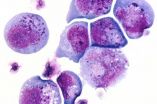(Press-News.org) High school biology taught us that we inherit certain traits from our parents that are pre-determined. But what if you could change how these genes play out by taking certain drugs or better yet, just changing your diet? That's exactly what a team of researchers at the Boston University School of Medicine (BUSM) have proposed through their research of epigenetics research.
Epigenetics regulates gene expression in a reversible manner by chemically modifying DNA and histone proteins, which prevent permanent mutations or alterations within the gene themselves. Throughout DNA processing, a single strand will go through countless modifications that determine whether certain genes will eventually be expressed. A single addition or subtraction of a few carbon and hydrogen ions can determine the silencing of a tumor suppressor gene or the overexpression of an oncogene. The researchers previously emphasized that pretreatment of cancer cells with epigenetic drugs in addition to standard chemotherapy may sensitize these cells to other cytotoxic (anti-cancer) drugs, especially important in the setting of drug resistance.
"Recent studies suggest that epigenetic modifications may contribute to the development of cancer progenitor cells that can induce drug resistance and the relapse of different types of cancer," said Sibaji Sarkar, PhD, instructor of medicine at BUSM.
Adult drug resistant cancer cells may contribute to this problem, and the authors discuss these and other cancer drug resistance mechanisms in their recent publication in the September issue of the journal Cancers.
Drug resistance is a major problem in cancer treatment, as drug resistant cancers are thought to be the primary cause of cancer relapse. The mechanisms that promote or enable drug resistance include drug inactivation, drug target alteration, drug removal from cells, DNA damage repair, cell death inhibition and the epithelial-mesenchymal transition (EMT) that enable solid tumors to transform into more metastatic grades. Cancer progression is extremely complex, and the variation in pathogenesis along with the heterogeneity of cancer cells in tumors and metastasized cancers, makes effectively treating cancer akin to hitting a moving target.
Cancer cells are opportunistic in the sense that they hijack cellular events necessary for development and survival. For example, genes involved in suppressing tumor formation are turned off via epigenetic mechanisms, and genes involved in rapid growth and replication are turned on too high. The authors hypothesize that in addition to these functions, epigenetic alterations may also serve as a common trigger through which susceptible and genetically predisposed stem cells become cancer progenitor cells. These progenitor cells are often drug resistant and can initiate cancer development and are possibly involved in cancer relapse. Moreover, epigenetic changes regulate cancer cell metastasis and the formation of heterogeneous cell populations that are very difficult to treat.
An example of epigenetic modifications leading to cancer progenitor cell formation possibly occurs in leukemia development. Mature leukemia cells express the MDR1 gene and are sensitive to normal drug regimens. However, cancer progenitor cells that highly express MDR1 are drug resistant. The MDR1 gene codes for a protein that helps to extract drugs from cells. When it is overexpressed, the cells become drug resistant. MDR1 expression is epigenetically regulated in leukemia progenitor cells, which makes it a prime target for possible drug therapies.
Studies in cancer patients indicate reduced rates of relapse when patients are pretreated with epigenetic drugs due to its far-reaching capabilities; killing progenitor cells at the site of the tumor, in circulation, or at a distant site. These drugs sensitize cancer cells to alternative treatments and stave off progenitor cells that could prevent cancer relapse. There already has been great effort to elucidate the mechanisms of gene expression regulation, but it will be important to continue research to fully realize the potential of these epigenetic therapies and their applications in clinical settings.
Epigenetic changes beyond a normal expression pattern can cause a variety of diseases. Previous studies have shown that a diet deficient in certain amino acids such as folate could alter some methylation actions in the liver, which if prolonged, could lead to hepatic carcinoma. Another study suggests that transient hyperglycemia could alter histone methylation, leading to diabetic complications. BUSM researchers also discussed in Genetics & Epigenetics (May 2014) how epigenetic modifications play a role in the development of diseases including cancer, cardiovascular, metabolic, neurologic and pulmonary disorders.
"The reversible nature of these changes gives us hope that epigenetic drugs will be able to manage and cure these types of diseases and disorders," said Sarkar.
INFORMATION:
Genevieve Housman, who serves as the first author of the Cancers article, was a student at Boston University (BU) and is now a graduate student at Arizona State University. Other BU student co-authors include Shannon Byler, Sarah Heerboth, Karolina Lapinska, Mckenna Longacre (currently at Harvard Medical School) and Nicole Snyder.
Epigenetic drugs: A hope to treat cancer resistance and reduce cancer relapse?
2014-09-16
ELSE PRESS RELEASES FROM THIS DATE:
Results of DKCRUSH-VI trial reported at TCT 2014
2014-09-16
WASHINGTON, DC – September 14, 2014 – A new study found that fractional flow reserve (FFR)-guided provisional side branch (SB) stenting of true coronary bifurcation lesions yields similar outcomes to the current standard of care. The DKCRUSH-VI clinical trial is the first study to compare FFR-guided and angiography-guided stenting.
Findings were reported today at the 26th annual Transcatheter Cardiovascular Therapeutics (TCT) scientific symposium. Sponsored by the Cardiovascular Research Foundation (CRF), TCT is the world's premier educational meeting specializing in ...
Results of RIBS IV trial reported at TCT 2014
2014-09-16
WASHINGTON, DC – September 14, 2014 – A new clinical trial comparing the use of everolimus-eluting stents (EES) and drug-eluting balloons (DEB) in treating in-stent restenosis (ISR) from drug-eluting stents found that EES provided superior late angiographic results and better late clinical outcomes.
Findings were reported today at the 26th annual Transcatheter Cardiovascular Therapeutics (TCT) scientific symposium. Sponsored by the Cardiovascular Research Foundation (CRF), TCT is the world's premier educational meeting specializing in interventional cardiovascular medicine. ...
UTMB professor implements lifesaving protocol for school children with severe allergies
2014-09-16
As the number of children with food allergies in the U.S. increases, so does the risk of children having a severe, potentially life-threatening allergic reaction called anaphylaxis on school campuses. School nurses often have treatment plans in place for students with diagnosed allergies, but many children have their first allergic reactions at school, where a specific medication, such as EpiPen epinephrine injectors, may not be available and a response protocol may not be in place.
Students with identified food allergies are generally well known to school nurses. School ...
Healthy humans make nice homes for viruses
2014-09-16
The same viruses that make us sick can take up residence in and on the human body without provoking a sneeze, cough or other troublesome symptom, according to new research at Washington University School of Medicine in St. Louis.
On average, healthy individuals carry about five types of viruses on their bodies, the researchers report online in BioMed Central Biology. The study is the first comprehensive analysis to describe the diversity of viruses in healthy people.
The research was conducted as part of the Human Microbiome Project, a major initiative funded by the ...
Benefit of endocrine therapy in elderly women with low risk hormone receptor positive breast cancer?
2014-09-16
Treatment with endocrine therapy and radiation therapy as part of breast conservation is the current standard of care for women with hormone-receptor positive (HR+) invasive breast cancer. A new study by researchers at Fox Chase Cancer Center, however, shows that combination may not be necessary for all patient populations with the disease.
The results, which Fox Chase researchers presented at the American Society for Radiation Oncology's 56th Annual Meeting on Sunday, September 14, suggest that low-risk patients over 65 years old with small tumors may achieve comparable ...
Study identifies when and how much various prostate cancer treatments will impact urinary and sexual functioning
2014-09-16
Men with prostate cancer may one day be able to predict when and how much various treatments will impact their urinary and sexual functioning, thanks in part to new findings that researchers at Fox Chase Cancer Center presented at the American Society for Radiation Oncology's 56th Annual Meeting on Tuesday, September 16.
Looking over data gathered from more than 17,000 surveys completed by men diagnosed with prostate cancer, Fox Chase researchers tracked when patients' urinary and sexual symptoms changed following each type of treatment, and by how much. "The ultimate ...
World Health Organization policy improves use of medicines
2014-09-16
In this issue of PLOS Medicine, Kathleen Holloway from WHO and David Henry (University of Toronto, Canada) evaluated data on reported adherence to WHO essential medicines practices and measures of quality use of medicines from 56 low and middle income countries for 2002-2008. They compared the countries' government-reported implementation of 36 essential medicines policies with independent survey results for 10 validated indicators of quality use of medicines (QUM). They claim that the results provide the strongest evidence to date that WHO essential medicines policies ...
Access to female-controlled contraception needed in intimate partner violence
2014-09-16
Access to female-controlled contraceptive methods must be improved in order to help women and girls to counteract any risks to their reproductive health caused by intimate partner violence and reproductive coercion,* according to US experts writing in this week's PLOS Medicine.
Jay Silverman and Anita Raj from the University of California in San Diego explain that intimate partner violence is a major contributor to poor reproductive outcomes, such as unintended pregnancy, among women and girls around the world.
The authors argue that to improve reproductive health, ...
Meteorite that doomed dinosaurs remade forests
2014-09-16
The meteorite impact that spelled doom for the dinosaurs 66 million years ago decimated the evergreens among the flowering plants to a much greater extent than their deciduous peers, according to a study led by UA researchers. The results are published in the journal PLOS Biology.
Applying biomechanical formulas to a treasure trove of thousands of fossilized leaves of angiosperms — flowering plants excluding conifers — the team was able to reconstruct the ecology of a diverse plant community thriving during a 2.2 million-year period spanning the cataclysmic impact event, ...
A novel therapy for sepsis?
2014-09-16
This release is available in Japanese.
A University of Tokyo research group has discovered that pentatraxin 3 (PTX3), a protein that helps the innate immune system target invaders such as bacteria and viruses, can reduce mortality of mice suffering from sepsis. This discovery may lead to a therapy for sepsis, a major cause of death in developed countries that is fatal in one in four cases.
Professor Takao Hamakubo's group at the Department of Quantitative Biology and Medicine, Research Center for Advanced Science and Technology (RCAST), have shown that PTX3 forms ...


